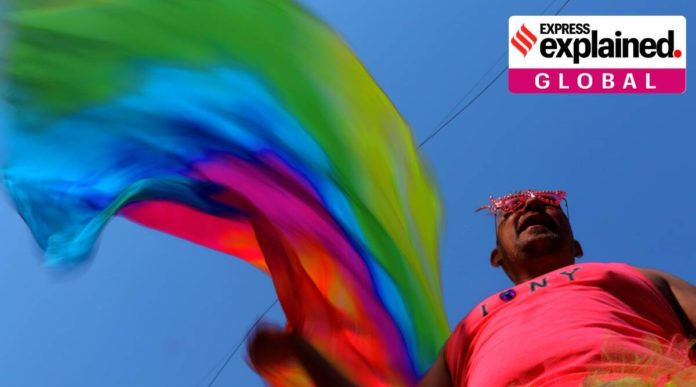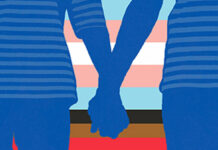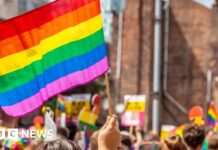
Attacks on the LGBTQ+ community have reportedly increased in Ghana since an anti-gay draft bill was introduced in the country last year. The bill is currently under review by a parliament committee.
A recent report by The Guardian said there were two instances where girls and women were allegedly raped by men for “being lesbian”. The report quoted a Ghana queer activist as saying, “Since the bill came out, we’ve seen a sharp rise in many types of violence… attacks from individuals, from communities. We’re also seeing a big rise in ‘corrective rape’.”
While the conduct of sexual activities between people of the same sex is already illegal in Ghana, if the bill is passed, it will completely criminalise people of the LGBTQ+ community along with activist groups or individuals who speak out in their favour.
Activists have said if the bill is passed in its current form, it could lead to a witch hunt for those who are a part of the LGBTQ+ community or belong to sexual minorities.
Subscriber Only Stories
What are the provisions in Ghana’s anti-gay bill?
The bill, titled ‘Promotion of proper human sexual rights and Ghanaian family values bill’, has been backed by one of the most prominent anti-gay figures in Ghana’s parliament, opposition MP Sam George. It has garnered the support of MPs across party lines.
“The object of the Bill is to provide for proper human sexual rights and Ghanaian family values; proscribe LGBTQ+ and related activities; proscribe propaganda of, advocacy for, or promotion of LGBTTQQIAAP+ and related activities; provide for the protection of and support for children, persons who are victims or accused of LGBTTQQIAAP+ and related activities and other persons; and related matters.”
The bill describes the LGBTQ+ community as a “taboo, inhuman and alien to our society”. It adds, “the idea of man marrying man and woman marrying woman is an abomination to our tradition and culture as Ghanaians…”.
If passed, the law will criminalise anyone who identifies as an LGBTQ+ person, is in a gay relationship, or has intercourse with the same sex. The bill proposes imprisonment for up to five years.
“The Bill applies to a person who holds out as a lesbian, a gay, a bisexual, a transgender, a transsexual, a queer, an ally, a pansexual, or a person of any other sociocultural notion of sex or sexual relationship that is contrary to the sociocultural notions of male and female or the relationship between male and female.”
Once the bill has been reviewed by a parliamentary committee, it will be sent to the MPs for amendments, before there’s another parliament reading and voting.
LGBTQ allies
The bill proposes to hold all allies and advocates of the LGBTQ+ community responsible, and imprison them for up to five years.
Also, anyone who “promotes” or advocates activities or rights of the LGBTQ community, will also be held responsible and can face imprisonment of up to 10 years.
“A person uses an electronic device, the internet service, a film, or any other device capable of electronic storage or transmission to produce, procure, market, broadcast, disseminate, publish or distribute a material for purposes of promoting an activity prohibited under the Bill commits an offence and is liable on summary conviction to a term of imprisonment of not less than five years and not more than 10 years. Clause 12 also prohibits a person from engaging or participating in an activity that promotes, supports sympathy for or a change of public opinion towards an act prohibited under the Bill commits an offence and is liable on summary conviction to a term of imprisonment of not less than five years or not more than ten years.”
Gender reassignment
Not just this, the bill also proposes to punish those who undergo gender reassignment or “creation of a sexual category other than the category of a person assigned at birth”. Those who marry or intend to marry someone who had undergone gender reassignment surgery can also be criminalised under the bill with a penalty of up to five years of imprisonment.
Cross dressing
Along with this, the bill also proposes to criminalise cross-dressing, which would let the authorities in prosecuting anyone who doesn’t dress as per their biological sex.
“Such acts mean a public show of amorous relations between or among persons of the same sex, or where one or more of the persons involved have undergone gender or sex reassignment and intentional cross-dressing to portray a gender different from a gender assigned at birth to the person, with intent to engage in an act prohibited under the bill … is liable on summary conviction to a term of imprisonment of not less than six months and not more than one year.”
Same-sex marriage
The bill proposes to declare that same-sex marriages and marriages with people who have undergone sex reassignment surgeries as void.
“A person who, in Ghana, administers, witnesses, abets or aids the solemnisation of a marriage or issues, aids or abets in procuring a certificate commits a misdemeanor and is liable on summary conviction to a term of imprisonment of not less than one year and not more than three years.”
Intersex therapy and medical treatment
The bill also proposes providing access to “medical help or treatment” to the members of the LGBTQ+ community. It will allow people to seek “therapy or any assistance” required.
“The government is empowered to liaise with an approved service provider to provide assistance in the form of therapy or any other assistance relevant to the circumstance, to persons who may be questioning their sex or for a parent whose child is intersex in order to, where necessary, assist the parent realign the child to the appropriate binary designation as determined by a medical practitioner.”
Adoption in case parent is from LGBTQ community
The bill proposes allowing courts to refuse the adoption of children or fosterage if the applicant is “a lesbian, a gay, a bisexual, a transgender, a transsexual, a queer, an ally, a pansexual, intersex, questioning or a person of any other sociocultural notion of sex or sexual relationship that is contrary to the sociocultural notions of male and female or the relationship between males and females.”








